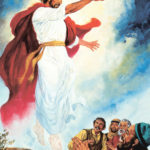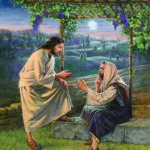The text for this lesson is Matthew 25:1–13
Key Point
- In Jesus’ story, the wise women were ready for the bridegroom. Jesus helps me to be ready for His return.
- Law: In sin, I believe that my deeds are good enough to earn salvation. I neglect the oil of God’s Word. When Jesus returns, He will reject those who are not waiting in faith.
- Gospel: The faith planted in my heart by the Gospel keeps my lamp trimmed, so I am ready for Christ’s return and can be confident that I will live with Him in heavenly joy forever.
Context
Commentary
The parable is steeped in the traditional wedding customs of first-century Israel. After long hours of negotiating the bride price, the groom would arrive at the bride’s home to be escorted to his own. The ten virgins are the bride’s attendants. Because this procession often happened at night, the attendants carried torches to light the way. In the parable, all ten virgins fall asleep. All fail at their task of watching for the bridegroom. This is reminiscent of when Jesus chides His disciples just two days later for not staying awake when He prays in the Garden of Gethsemane (26:40). Like the virgins, we also are inattentive. We do not live in constant, joyful anticipation of our Lord’s reappearing. We live life as if it is its own end.
But for what should we prepare? It is a key question. Certainly, we should be prepared for the Bridegroom’s coming, but more specifically, we should be prepared for waiting. This was the failing of the foolish virgins, that they were not prepared to wait, whether that wait would be short or long. As Christians, we are waiting for the Bridegroom, our Savior, Jesus. We have received the gifts of life and salvation through the Word of the Gospel. We are called to be faithful, ready if the Bridegroom comes immediately and ready if He is delayed.
How then should we prepare for the wait? We prepare by being faithful. Our faith, that which sustains us in the hours of waiting, is strengthened and nourished in the same way it is given, through the Word of the Gospel. Someone who is not receiving the gifts is going to eventually forget about them.
The wise virgins send the foolish to the dealer for oil. As we wait, then, we also go to our oil dealer, the Church, the place where God gives the gift of faith through His appointed means, to receive the oil of the Gospel that we need to keep our lamps trimmed and burning. We come regularly to the Divine Service to confess our sins, receive Absolution, and hear God’s Word proclaimed. We continue in the Word. We daily recall our Baptism.
To be truly prepared for our Lord’s reappearing, we must always be receiving the forgiveness of sins that Christ won for us on the cross. It is only there, in the Lord’s appointed means, that we will ever have anything to put into our lamps.






